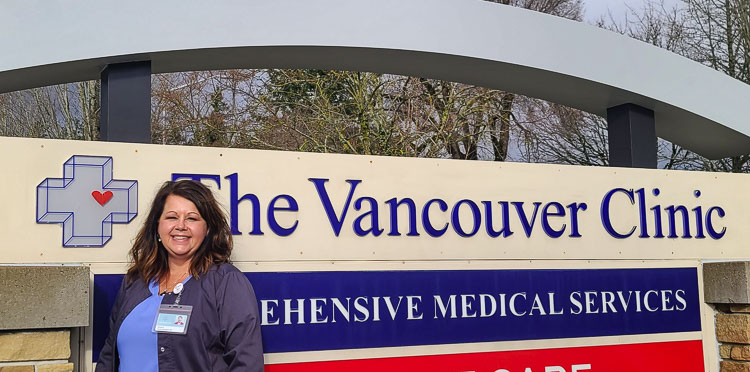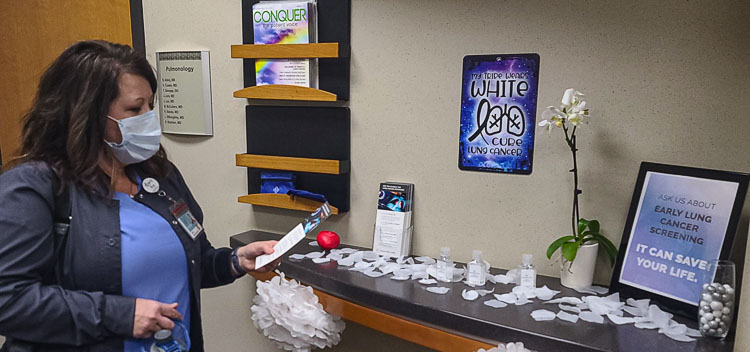Renee Klein promotes early screening for lung cancer and provides help throughout a patient’s journey at Vancouver Clinic
It has been nearly 10 years since Renee Klein lost her mother to cancer.
A decade later, DeeDee Dobbins is still inspiring her daughter. Deedee’s story is why Renee Klein does what she does.
“I feel like she went way too fast, and I don’t want other family members to lose someone in that short amount of time,” Klein said.

A nurse for more than 20 years now, Klein has held a variety of positions. She even got into management for a bit.
“One day, I said, ‘This is not where I’m supposed to be. I’m supposed to help patients. I’m supposed to guide them through this mess of a medical system,’” Klein said.
Klein is a registered nurse and a nurse navigator, working for Vancouver Clinic, part of a relatively new team with a mission to invite eligible patients to get screened for lung cancer.
There is so much more to it than that, though.
Klein brings a caring soul to the job, a person with a passion for getting to know the patients.
The Lung Cancer Screening Program does use analytics, but the patient will never be just a number in the eyes of Klein.
“When I’m talking to people, they have my full attention,” Klein said. “It’s about them.”
The Lung Cancer Screening Program at Vancouver Clinic opened in the fall of 2019. Since then, Klein, doctors, and other medical professionals have worked together to scan more than 1,500 people. (Scans take about 15 minutes.) The hope is to find nothing suspicious, but the patient remains in the program and will be called for another scan after a year. If there are nodules that are of concern — in size and/or shape — another scan might be ordered in three to six months, to determine if it is growing. And on the rare occasion that a nodule is large enough to require immediate attention, Klein and the team get that patient to a pulmonologist as soon as possible.
It is important to note that not all nodules are cancerous.
The United States Preventive Services Task Force recommends lung cancer screening for individuals between the ages of 55 to 80, who do not have signs or symptoms of lung cancer, have not had lung cancer previously, currently smoke, or quit smoking less than 15 years ago, or have ever been heavy smokers.
“It’s not a judgement thing. A screening is not because you did something bad,” Klein said. “A screening is preventive. Everything we put forth is positivity.”
In a perfect world, all who are eligible would enroll in the screening program and get scanned, Klein said. That way, a patient and medical team will be on top of any changes.
The Agency of Healthcare Research and Quality notes that lung cancer is often diagnosed once it has spread outside of the lungs. Close to 9 in 10 people with lung cancer die from the disease because it is found after it has spread.
“With lung cancer screening, we can pluck out tiny nodules when they are cancerous without it spreading to the brain or the liver,” Klein said. “That’s the purpose.”
Something that was not available to Klein’s mom.
On Halloween of 2011, Deedee said she would not be able to celebrate trick-or-treating with her grandchildren because she had pneumonia. She had an X-Ray that day. There was something there, but the doctor could not tell exactly what it was. Deedee was told to come back. She would not get her first CT scan until Nov. 29.
The tumor was 5 centimeters. Two weeks later, another test found it had grown. Around that time, doctors found tumors in the liver and in the brain.
On Dec. 22, she was diagnosed with Stage 4 lung cancer. She died on Feb. 19, 2012. She was 81.
Had there been such a lung screening program, with today’s available technology, a patient such as Deedee could have been scanned several times through the years, maybe caught the cancerous nodule at the earliest sign possible. There could have been more options.
That is why Renee Klein does what she does. Early detection saves lives. As does a workable treatment plan when everyone is on the same page.
“That’s good stuff,” Klein said of early detection. “That’s not the fun stuff. The fun stuff is making a difference with the patients.”

She gave an example of one case. A patient came in for a lung scan. There was something there. That patient had a series of tests and was in treatment with an oncologist within days.
And there was a nurse navigator leading the patient through the journey.
Klein said Vancouver Clinic is collaborating with Peace Health and Legacy. All eligible patients can come to Vancouver Clinic for the Lung Screening Program. And all results will be sent to the patient’s primary care provider.
“Work together for the best interest of the patient,” Klein said.
Another potential benefit to the screening program is that the scan can sometimes detect other ailments, and while this is not the purpose of lung cancer screening, it can turn out to be helpful. One patient learned she had breast cancer from the scan. Another had coronary artery disease. The lung scan should not be used in place of a test for other conditions, but it can be a helpful tool.
A patient in the Lung Screening Program has an ally in Klein. The patient might forget about a follow-up appointment, but Klein’s computer will not. Klein has set up notifications. Patients in the program should expect calls from Klein.
If a patient was given a referral to a new specialist, but that office has not made contact in a timely manner? Expect a call from Klein.
“I navigate these folks,” Klein said. “All of this helps that process move along, and that’s what saves lives. Early screening. Early detection. And navigation with a personal touch.”
Oh, and that phone call is not just a reminder about an upcoming appointment. Do not be surprised if Renee Klein asks about your grandchildren or your pets.
“I can’t tell you how proud I am to be part of this. It lets me be my true self,” she said.
Notes: On this final day of November, we say goodbye to Lung Cancer Awareness Month. But Klein and the team at Vancouver Clinic want to extend an invitation to those who are eligible to enroll into the lung cancer screening program. Lung cancer remains the No. 1 killer among cancer in men and women in the United States. However, there has been a 50-percent increase in the 5-year survival rate, due to new treatment, new technology, and early detection.
For more information on lung cancer, go to: https://lcfamerica.org/get-involved/november-lung-cancer-awareness-month/
For more information on the lung screening program at Vancouver clinic, go to: https://tvc.org/services/pulmonology/
For additional questions, call the nurse navigator line at (360) 541-2253.




